Posted by Elena del Valle on February 25, 2013
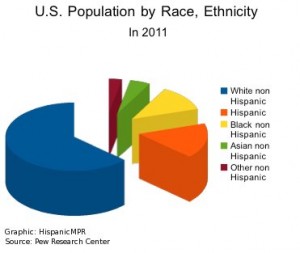
U.S. Population by Race, Ethnicity in 2011 – click to enlarge
In 2011, Hispanics represented 16.7 percent of the United States population and 23 percent of births. In other words, Latinos represented one sixth of the population and almost one quarter of all births. Those estimates, compiled by the Pew Research Center, include undocumented immigrants said to be as many as 12 million and 80 percent of which are thought to be Latinos. Two thirds of Hispanics can be found in just five states: California, Florida, Illinois, New York and Texas, according to analysis of U.S. Census and American Community Survey data by the Pew Research Center.
Overall, the Hispanic population grew 47 percent between 2000 and 2011 from 35.2 million, representing 12.5 percent of the country’s population, to 51.9 million. Growth in some states was higher. An example of such higher growth was Florida where the Hispanic population grew 62 percent in that time period.
Although high school drop out rates among Latinos 16 to 19 years of age are believed to have dropped significantly from 17.5 percent in 2000 to 6.8 percent in 2011 all is not rosy among the growing demographic group. The ethnic group had the next to lowest household income in 2011 when the median income of a Latino household was $39,000 compared to $67,000 for Asian households, $54,000 for whites and $32,600.
Also, 13 million Hispanics, 25.9 percent of the Latino population, are thought to live in poverty and 22 percent receive food stamps; placing second to last on those lists. African Americans at 27.9 percent in poverty and 28 percent on food stamps were the only ethnic group with more alarming conditions. At the same time, Latinos had the highest percent of people without health insurance, 30 percent, compared to 10.8 percent for non Hispanic whites, 15.4 percent for Asians and 18.6 percent for blacks.
Posted by Elena del Valle on February 22, 2013
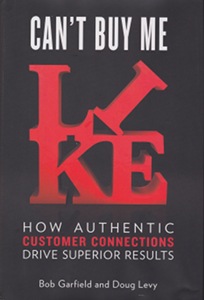
Can’t Buy Me Like book cover
Photos: Youplusme, Michael Albans
An ad critic and agency founder believe we are in the Relationship Era, a time when consumers have a voice that is especially loud on social media channels and when advertising alone isn’t enough. Some of the best performing companies in this era, they believe, strive to communicate in an authentic and transparent way that generates trust and superior results, according to Doug Levy, founder and chief executive officer, Meplusyou, and Bob Garfield, co-host, NPR’s On the Media.
In their book, Can’t Buy Me Like: How Authentic Customer Connections Drive Superior Results (Portfolio, $25.95), a 229-page hardcover book published this year, they outline their thoughts about the Relationship Era illustrating their opinions with case studies of well known brands such as Patagonia, Panera, Citibank, McDonald’s, Progressive Insurance and United Airlines.

Bob Garfield, co-author Can’t Buy Me Like
Garfield explained by email that the book was written for anyone in an institution that has attempted to manage or manipulate perceptions of its organization through advertising or public relations. The book project took about 18 months from beginning to publication in addition to the years of experience associated with the topic, he said.
The authors are convinced four main factors have led the way to the Relationship Era: the fragmentation and collapse of mass, the increase of transparency, the rise of social connectivity and trust relationships with peers. In their opinion, these changes have resulted in power shifts that have removed absolute control of a brand’s image and reputation from the brand and the public’s ability to share positive and negative information in social media forums.
Instead of listening to customers in order to find a way to manipulate them into buying their product or service, marketers need to change their approach, the authors say. Everyone wants to be liked but being liked genuinely is different from being bribed or browbeat into liking someone as some people attempt to do, they point out.
Brands with authenticity will win over customers while brands that try to pull a fast one will be found out, according to the authors. They go on to point out that relationships based on trust require effort and time; that they are the result of cultivation rather than persuasion.
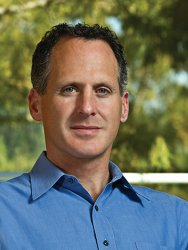
Doug Levy, co-author Can’t Buy Me Like
Levy explained by phone that a site with purchased likes has diminished credibility. He went on to say that an example of likes that are hard to fake are those from friends in social media. It’s his opinion that companies that care for something other than just making money and that develop relationships based on trust stand out and find success. Examples of companies that care about something beyond profit, even though they are imperfect, include Apple, Southwest Airlines, and Whole Foods Market. He’s concerned that people who see how powerful relationships based on care and trust are will attempt to fake it. People can tell when a company’s behavior and its message don’t match, the author said.
The book is divided into eleven chapters: Good-bye to All That; The Relationship Era; Trust Me; On Purpose; Sustain; The Secret Secret; That Thing Called Like; The Shift; Does and Don’ts and No, Really, Don’ts; Bank and Trust; and This Could be the End of a Previously Very Good Relationship.
Comments:
Filed Under: Books
Posted by Elena del Valle on February 18, 2013

The top 15 HispanicMPR.com interview podcasts in 2012 are, in descending order and with the title and affiliation of the original recording: Tracy Vega director, Marketing and Publicity, Rio Nuevo Publishers; Martha Montoya, president, Los Kitos Entertainment, LLC; Orly Wahba, CEO, Life Vest Inside; Jaime Suchlicki, Ph.D., editor, Cuban Affairs, University of Miami; Juan Ochoa, director, Program Development, MFM Trade Meetings; Alex Carvallo at Intel; Arturo Nuñez and Saskia Sorrosa, NBA representatives; Tom Anderson, managing partner, Anderson Analytics; Gloria Ruiz, Ph.D., department chair, St. Thomas University; John Mayerhofer, CEO, VoiceIndigo; Bill Colton, president, Global Telesourcing; Matias Perel, founder, Latin3; Camille Preston, CEO, AIM Leadership; Louis Pagan, host, Latino Pundit; and Daniel Ayala, senior vice president, Well Fargo.
Three individuals, Martha Montoya, Jaime Suchlicki, and Daniel Ayala also appeared in the most recent tally of the top 25 podcast interviews released in 2010. The 2010 list includes, in descending order of popularity: Rupa Ranganatan (2007), John Mayerhofer, Laura Hernandez, Michele Valdovinos, Jaime Suchlicki, Ph.D., Matias Perel, Cynthia Nelson, Daniel Ayala, Carlos Santiago and Derene Allen, Derorah Ramirez, Martha Montoya, Liria Barbosa, Jose Reyes, Demian Bellumio, Mabel Valdiviezo, Teresa Iglesias Solomon, Maria Azua, Edna Chun, Ph.D., Carlos Alfaro, Antonio Otalvaro and Noah Otalvaro, Steve Bergsman, Gail Mills, Federico Subervi, Ph.D. and Diana Rios, Ph.D., Cynthia Hudson, and Kathleen Haley.
Visitors may download podcasts for playback on their electronic devices or listen to them on the HispanicMPR.com Podcast Player (box with blue background on the right side of the page) or on the article page for the corresponding interview on the HispanicMPR.com website. A comprehensive list of podcast guests beginning in 2006 may be found at https://www.hispanicmpr.com/podcast-list/
Posted by Elena del Valle on February 15, 2013
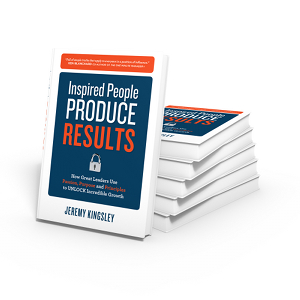
Inspired People Produce Results
Photos: Jeremy Kingsley
In his recently published book, Inspired People Produce Results: how great leaders use passion, purpose, and principles to unlock incredible growth (McGraw-Hill, $24.95), Jeremy Kingsley, who makes a living as a speaker, explains why he believes leaders share common characteristics that drive employees to success.
He calls workers born between 1965 and 1994 Generation Me and points out that while “They are smart, optimistic, creative, and flexible, and thrive on diversity” they also are described as having a sense of entitlement, being opinionated, having a free-spending style, and insisting on knowing why they are to do something when assigned a task.
While employees follow the instructions of a manager they do more when they follow a leader so those who want to go to the next level and find success should strive to lead, he says. According to him perhaps the most important attribute of a manager or leader is his or her ability to inspire others.
To succeed at the front of the line in the twenty-first century leaders should, he says in the book, have passion, purpose, loyalty, strive to establish a positive working environment, give personal attention to each person in their team, be understanding, and have patience, good communication skills, and integrity.
The 192-page book is divided into ten chapters: What Do Leaders Do? Inspire; What Inspires People? Passion; What Inspires People? Purpose; What Inspires People? Loyalty; What Inspires People? Caring, Part I; What Inspires People? Caring, Part II; What Inspires People? Understanding; What Inspires People? Patience; What Inspires People? Communication; and What Inspires People? Integrity.
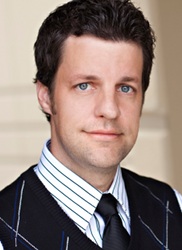
Jeremy Kingsley, author, Inspired People Produce Results
Kingsley, president of OneLife Leadership, has spoken to over 500,000 people at live events around the world, according to his biography. The author of four books lives in Columbia, South Carolina with his wife and two sons.
Comments:
Filed Under: Books
Posted by Elena del Valle on February 12, 2013
The Press Officer’s primary focus will be to implement media relations strategies to inform and influence key audiences on reproductive health and policy issues and promote Planned Parenthood Federation of America (PPFA). S/he will also be responsible for producing material for media, respond to media requests, and proactively reach out to media outlets. Click to read entire Press Officer Planned Parenthood Federation of America (NYC)
Posted by Elena del Valle on February 11, 2013
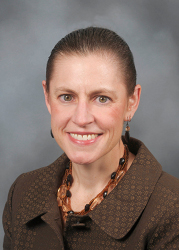
Ivy Alexander, Ph.D., APRN, ANP-BC, FAAN, professor, Yale University School of Nursing
Photo: Ivy Alexander
A podcast interview with Ivy Alexander, Ph.D., APRN, ANP-BC, FAAN, professor, Yale University School of Nursing is available in the Podcast Section of Hispanic Marketing & Public Relations, HispanicMPR.com. During the podcast, she discusses menopause and osteoporosis with Elena del Valle, host of the HispanicMPR.com podcast.
Ivy is also midlife women’s health consultant and nurse practitioner at Yale Health. Her clinical, scholarly and research interests are in Midlife Women’s Health Care. She wrote, as lead author, with Karla A. Knight, RN, MSN 100 Questions & Answers about Menopause and 100 Questions & Answers about Osteoporosis and Osteopenia. She has worked extensively with menopause and osteoporosis management, and has published and presented widely regarding these subject areas including these books, which have been translated into Spanish, Greek, and Italian.
She has been principle investigator on studies evaluating women’s relationships with their primary care providers; Black women’s perceptions of menopause, midlife health risks, and self-management techniques used to manage menopause symptoms and reduce health risks; and osteoporosis risks and management. She has consulted for national and international companies such as Athena Medical Products, Medscape, Wyeth-Ayerst, Duramed Pharmaceuticals, Pfizer, Eli Lilly, Roche, Venus Medical Communications, Amgen, Depomed and Datamonitor.
To listen to the interview, scroll down until you see “Podcast” on the right hand side, then select “HMPR Ivy Alexander, Ph.D.” click on the play button below or download the MP3 file to your iPod or MP3 player to listen on the go, in your car or at home. To download it, click on the arrow of the recording you wish to copy and save it to disk. The podcast will remain listed in the February 2013 section of the podcast archive.
Posted by Elena del Valle on February 8, 2013
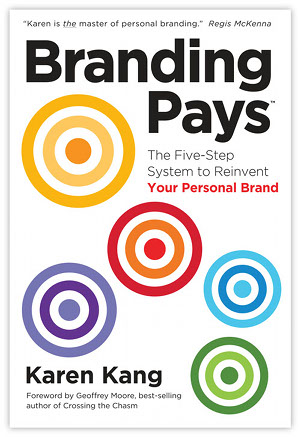 Branding Pays
Branding Pays
Photos: BrandingPays LLC
Karen Kang, founder of a personal branding company, believes a person’s brand is possibly his or her most important asset and that today’s global reach makes personal branding essential. According to her, where competition used to be local in the past, today competitors can be found across international boundaries and making an impression is more important than ever. In BrandingPays: The Five-Step System to Reinvent Your Personal Brand (BrandingPays LLC, $24.95), a 207-page hardcover book published this year, she defines a personal brand as a person’s image and reputation and explains her reasons for prioritizing branding.
Adapting to a changing environment, understanding who you are and the value you bring are basic steps in reinventing your personal brand, she says in the book. She wrote the book for professionals seeking new employment opportunities, recent graduates looking for their first job, and entrepreneurs needing to develop personal and company identities.
The book is divided into a short Introduction, a Conclusion and eight chapters: Take Charge of Your Personal Brand; Positioning; Messaging; Brand Strategy, Ecosystem; Action Plan; 360-Degree Branding: Vision, Symbols, Words and Deeds; and Portable Branding and Social Media: Getting Started. In the book, Kang uses case studies to illustrate her points. In the Conclusion, she points to results from one of her personal branding seminars at a Fortune 100 company where all the participants in the program for women executives accomplished their goals of promotion or a different job within one year of the seminar.

Karen Kang, author, Branding Pays
Kang, a brand strategist with twenty years of experience, is chief executive officer of BrandingPays LLC. A former partner with Regis McKenna Inc. she has trained thousands of professionals on the BrandingPays System for personal branding, and has consulted for 150 organizations, according to her biography. She is a former journalist turned advertising and public relations practitioner.
Comments:
Filed Under: Books
Posted by Elena del Valle on February 4, 2013
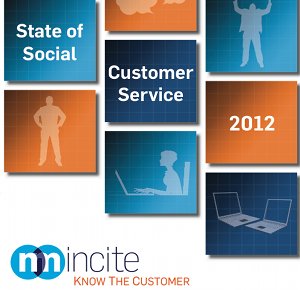
State of Social Customer Service Report 2012
In July 2012, NM Incite, a joint venture between Nielsen and McKinsey & Company dedicated to measurement science and management consulting, surveyed a representative group of 2,000 United States social media users 18 and older using Nielsen’s online panel. In the eight-page State of Social Customer Service Report 2012, they concluded, among other things, that 47 percent of all social media users have used social care, a system for companies to provide customer service in social media platforms. Such usage crossed ages and genders among survey responders and was as high as 60 percent among women 18 to 24 years of age.
Based on the responses to the survey they believe 71 percent of those who said they experience positive social care, meaning a speedy and effective response, said they are likely to recommend that brand to others, compared to 19 percent of customers who said they had had no response. Also, the researchers estimated that nearly one in three social media users preferred to contact customer service through a social media channel instead of calling.
The survey staff found that more than half of social media users 45 and younger said they take advantage of social care. At the same time, those who went to social media to share their gripes or questions wanted responses in their channel.
They also concluded that one negative experience with customer service shared in a public forum could void the effect of five positive customer messages. More than half (51 percent) of people who said they rely on social care said they engage with brands several times each month and 9 percent said they engage daily.
Posted by Elena del Valle on February 1, 2013

APE How to Publish a Book
Photos: Guy Kawasaki, Shawn Welch
It has become increasingly popular for leaders, business executives and owners and news makers to author non fiction books in which they espouse their ideas on an area of expertise. At the same time, the availability of e-readers and digital books has expanded the reach of potential readers, made books more affordable and reduced the need for intermediaries. Fast changing digital book technology has made publishing ever easier and accessible.
Digital books have a long shelf life, lend themselves to revisions more readily and easily than print books, pay (if they sell) authors better, expand distribution beyond domestic borders, and allow authors and readers direct contact. However, understanding the fragmented, and at times confusing, book publishing industry can be trying.
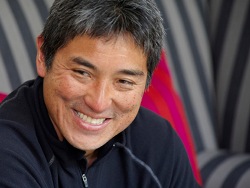
Guy Kawasaki
In 2011, the publisher of Guy Kawasaki’s The New York Times bestseller, Enchantment, could not fill an order for 500 ebook copies of the title. The experience, led Kawasaki to self-publish his next book, What the Plus! As a result, he learned first-hand many of the issues related to today’s self-publishing process. He then collaborated with Shawn Welch, an app developer and author, to write and publish APE: Author, Publisher, Entrepreneur How to Publish a Book, a 324-page book, available in printed and e-book formats, published in late 2012.

Shawn Welch
Each chapter features a quote at the beginning and a short summary at the end. The authors begin by addressing the reasons for writing a book, advising would be writers that writing can be a “lonely and difficult process” and inviting them to reflect on the reasons they want to write. The changes in the publishing industry that make self publishing accessible to a broader group of writers than ever before don’t guarantee better books just a more accessible system, they explain later on.
They call the process of self publishing artisanal publishing and describe three main aspects required for success, authoring, publishing and promoting the title. The book itself is divided into sections to address the three areas. Kawasaki and Welch believe that type of publishing, in contrast to traditional print publishing, allows authors to control every aspect of the process, freeing them from the ties that used to bind them to large, traditional publishers.
Kawasaki is the author of nine other books in addition to the three mentioned above. He is the co-founder of Alltop.com website. Previously, he was the chief evangelist of Apple. Welch is the author of From Idea to App, iOS 5 Core Frameworks, and iOS 6 for Developers as well as the developer of several iOS apps. Previously he worked as a senior media-editor for Pearson Education.
Comments:
Filed Under: Books








 Branding Pays
Branding Pays














